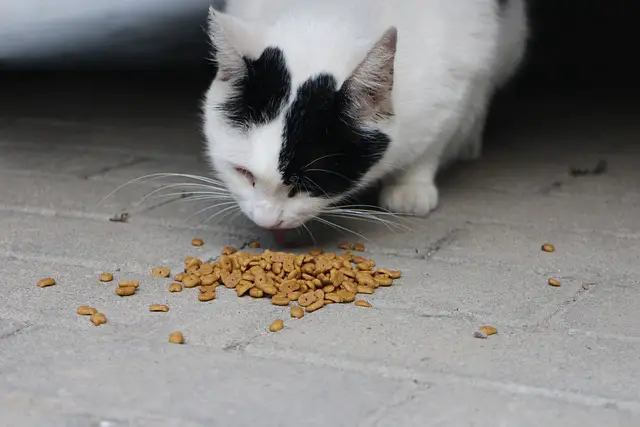If you’re a cat owner, you may have noticed that your furry friend rarely finishes its food. This can be incredibly confusing if your feline tends to eat the same meals day after day. So why is it that cats don’t always finish their food? Let’s look at some of the most common reasons this happens and what you can do to ensure your cat gets enough to eat.
Six reasons Why my cat never finishes its food?
1. Your cat may not be finishing its food because it is not hungry.
Cats are intelligent and discerning animals that won’t overeat if they don’t need to. So if your cat suddenly turns its nose up at its food, it could send you a message that it’s not hungry.
Your pet may need a break from the same and same menu, so altering the food or switching to a new brand can stimulate an appetite.
Consider providing variety in food types such as wet and dry – your cat might benefit from adding crunchy freeze-dried snacks into their mealtime.
Your furry friend will only eat if properly motivated, so ensure their diet is well-balanced for optimal health.
2. It does not like the food you are giving it.
Many cats can be fickle about their food preferences, so owners must experiment before settling on a diet.
If your cat is not finishing its food, it could be because the nutrient profile is not satisfying its needs.
In addition, some cats can experience digestive issues if their diets are switched too frequently or abruptly, which might explain why your cat may not be plowing through its bowl.
To ensure your pet stays happy and healthy, monitor how much food is being consumed and whether there are any sudden changes in their eating habits.
3. Because it is sick.
There are many potential causes for a cat not eating all its food, but its health is an essential factor to consider.
Cats can become sick with various diseases and conditions, just like humans.
If your cat stops finishing its food, it may indicate that something is wrong; therefore, it is best to take your cat to the vet for a check-up.
After ruling out any medical causes of this behavior, you can look into other factors, such as the type or brand of food you provide to your cats or dietary habits.
4. Because it is stressed.
It’s not uncommon for cats to leave food in their bowl and refuse to eat it.
This behavior can be caused by something as simple as an improper diet or a lack of variety, but it could also be linked to underlying stress.
Anxiety and routine changes can make a cat feel uneasy, leaving them unable or unwilling to finish their meal.
If your pet has trouble getting past its anxieties and finishing its feedings, try introducing calming activities like gentle petting or brushing.
Additional environmental enrichment, such as toys and scratching posts, can help invigorate them back into an appetite.
5. Because it is old.
As cats age, their senses become heightened. Taste and smell, in particular, can be affected by age, and this can cause elderly cats to lose interest in their food.
Older cats may no longer find their staple kibble as appetizing or may have access to a greater variety of exciting scents through their enhanced powers of smell.
Food that was once palatable may now seem dull or even distasteful to them due to these changes in perception.
To ensure your senior cat gets the nutrients it needs, consider mixing its old food with new options like wet or poached foods for added flavor, or purchase unique recipes designed for senior felines.
Above all else, ensure your cat is seen regularly by a vet who can help determine the best nutritional path during its twilight years.
6. Your cat may not be finishing its food because it is pregnant or nursing.
Generally, when a cat is pregnant or nursing, it will have the instinct to eat more frequently.
As cats’ appetites increase during these times, the amount of food eaten in each meal may decrease depending on the size of their litter and available resources.
When this is the case, your feline friend may not finish their food due to their ever-growing hunger.
To ensure your pet gets sufficient nutrition while pregnant or nursing, consider switching to high-calorie wet food packed with essential nutrients.
Additionally, providing more frequent meals may be necessary, and adding additional protein sources such as cooked chicken and other forms of animal proteins for extra calories.
Be sure to transition slowly not to upset your cat’s digestive system.
Conclusion
Cats typically enjoy grazing throughout the day and prefer access to their food at all times. If your cat is a particularly picky eater or isn’t finishing its food, there are numerous things that you should consider.
- First, ensure they have fresh and unspoiled food daily; if the food has been sitting out for too long, it may lose its flavor and appeal to them.
- Second, try mixing wet and dry food or opt for various flavors.
- Additionally, many cats like to eat in private, away from other animals, so providing the appropriate space can allow your cat to focus on eating.
- Lastly, if all else fails, it’s essential to see your veterinarian, as there may be an underlying medical condition causing this behavior.
[su_box title=”Affiliate Disclosure”]This website is supported by its readers. Please assume that all links are affiliate links. If you make a purchase from one of the links we will make a commission from Amazon. Thank you.[/su_box]




